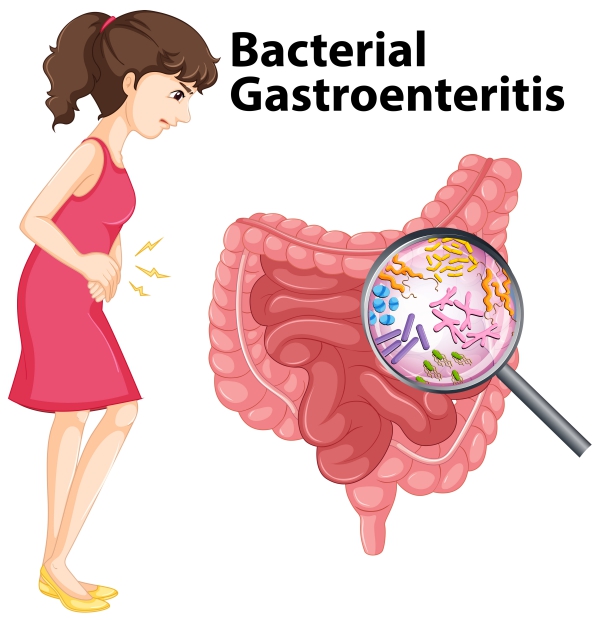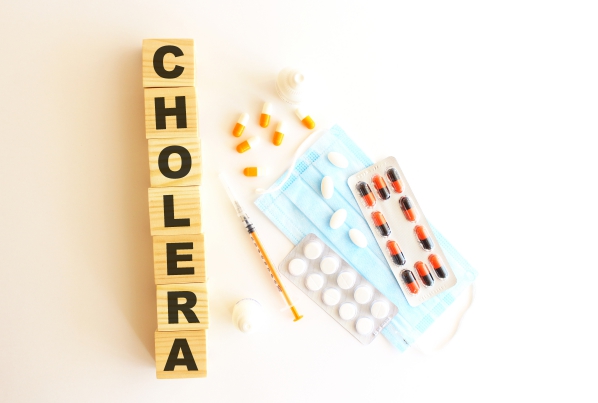What is bacterial gastroenteritis?
Bacterial gastroenteritis, a very common disorder, is an intestinal infection caused by a bacteria. There are several causes for this condition and can range from being mild to severe. It is marked by the presence of vomiting, diarrhoea and abdominal pain. These symptoms can be present in other diseases and therefore the diagnosis should properly be made to initiate treatment accordingly. Bacterial gastroenteritis is resolve on its own, however, if the disease is not properly managed, it can follow an unfavourable course. The main complication from this disease is dehydration, due to excessive water loss.
Bacterial gastroenteritis is a very common condition accounting for a significant amount of hospital visits. 5% of visits and 10% of hospitalizations among children are due to diarrhoea. Gastroenteritis is thought to be underreported among adults as many of them do not seek medical help for the problem. 8 million visits and 250,000 hospitalizations among adults are due to gastroenteritis per year. Its occurrence is higher in developing countries due to the lack of proper sanitation. Statistics show that during the period of 2001-2013, the most common causative pathogen has been Clostridium perfringens. The disease affects both men and women and dehydration is more likely to occur in children.
What are the causes of bacterial gastroenteritis?
The 3 most common bacteria that can lead to bacterial gastroenteritis are Salmonella, Shigella and Campylobacter species. Aeromonas species are also close to the previous ones. Aeromonas and Shigella infections are most common during summer and fall while Campylobacter infections mostly occur in summer months. Once the bacteria enter the body and intestines through contaminated food ingestion, they start to secrete toxins. These toxins lead to the development of symptoms such as diarrhoea.

The above bacteria may be acquired from ingestion of a variety of contaminated foods including pork, dairy products, meat, eggs, water, poultry, ground beef and salads. Outbreaks can also occur if restaurants have served contaminated food to many people. The bacteria can also be transmitted from one person to another as it can be present on the hands. Touching food, objects or other people with contaminated hands can increase the spread of the disease.
What are the risk factors for bacterial gastroenteritis?
Risk factors for bacterial gastroenteritis include the following:
- Travelling very often
- Living in an overcrowded area
- Not having a proper hygiene
- Having a weak immune system
- Taking medications that decrease the stomach’s acidity
- Eating undercooked meals
What are the signs and symptoms of bacterial gastroenteritis?
The signs and symptoms that can be present in bacterial gastroenteritis include:
- Diarrhoea
- Vomiting
- Blood in stools
- Severe abdominal pain
- Loss of appetite
- High fever
- Nausea
- Dehydration
- Lethargy
- Decreased level of consciousness
- Dry mouth
- Sunken eyes
- Weight loss


How is the diagnosis of bacterial gastroenteritis made?
To make the diagnosis of bacterial gastroenteritis, your doctor will start by asking you a series of questions to know more about your symptoms. He/she will then proceed with a thorough physical examination to look for signs of bacterial gastroenteritis. Stool tests can be performed to look for the presence of white blood cells, which makes it more likely to be of bacterial origin. Other tests can be done to help in tailoring the most appropriate treatment as well as to track for any outbreaks. These test include bacterial culture.
How is bacterial gastroenteritis treated?
The treatment for bacterial gastroenteritis is usually supportive as the disease tends to resolve on its own. The main step in the treatment of bacterial gastroenteritis is rehydration through oral fluids. This is to prevent dehydration as large amounts of water is lost through diarrhoea and vomiting. Young infants and neonates are at higher risk of having complications. If fluids cannot be taken orally, fluids will have to be administered directly into the veins. The amount of fluids will depend on the severity of the dehydration.
In some cases, antibiotics may have to be taken. However, this is rarely needed. Antidiarrheals are not recommended if bacterial gastroenteritis is suspected. Stopping the diarrhoea will only favour the build-up of bacteria in the body. Diarrhoea is a means to get rid of the bacterial load. Your doctor will decide whether it is essential for you to be admitted for your treatment.

The BRAT diet (bananas, rice, applesauce and toast) has been recommended since long for gastroenteritis. This is usually useful in early stages and the diet should be advanced as you are able to tolerate solid foods.
What are the possible complications of bacterial gastroenteritis?
Complications that can arise from bacterial gastroenteritis depends on the bacteria present. The following are the potential complications:
- Intussusception
- Haemolytic uremic syndrome
- Liver failure
- Meningitis
- Cholecystitis
- Urinary tract infection
- Pancreatitis
- Chronic diarrhoea
- Septicaemia
- Seizures
- Rapid dehydration
- Appendicitis
- Bowel perforation
How can bacterial gastroenteritis be prevented?
To prevent bacterial gastroenteritis, you should avoid eating undercooked meats and seafood. Make sure that you are not consuming contaminated water when you are travelling to reduce the risk. For some bacteria, vaccines are available. Discuss with your doctor to know which vaccine is recommended if you are planning to travel to high risk countries.
What is the prognosis for bacterial gastroenteritis?
If the proper diagnosis is made and appropriate treatment is initiated, the prognosis for bacterial gastroenteritis is excellent especially in industrialized countries. The main cause of death related to bacterial gastroenteritis is due to severe dehydration and malnutrition from a declining course of the disease. Severe dehydration is usually treated by the administration of intravenous fluids. Once malnutrition starts, the prognosis is poor. Neonates and infants are more at risk of having these complications.


Source:
Bonheur, J., 2018. Bacterial Gastroenteritis
Marks MI. Infectious diarrhea: introduction and commentary. Pediatr Ann. 1994 Oct. 23(10):526-7.
Hamer DH, Gorbach SL. Infectious diarrhea and bacterial food poisoning. Feldman M, Scharschmidt BF, Sleisenger MH, eds. Sleisinger and Fordtran’s Gastrointestinaland Liver Disease. 6th ed. Philadelphia, Pa: WB Saunders; 1998. 1594-1632.
Vital Signs: Preventing Clostridium difficile Infections. MMWR Morb Mortal Wkly Rep. 2012 Mar 9. 61:157-62.








